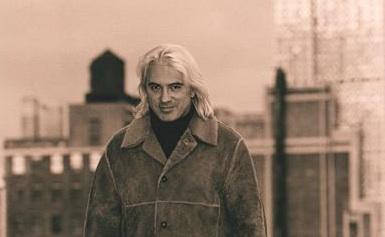by Ellen Fishbein

Dmitri Hvorostovsky in New York.
Photo by Pasha Antonov © Hvorostovsky.com
Sergei Rachmaninoff's songs glide from grandiosity to the tenderest edges of the musical palette. Drawing inspiration from his chosen composer (and perhaps acknowledging the critiques of his own bombastic style), Mr. Hvorostovsky opened this recital with the composer's “My child, you are beautiful as a flower,” (Op. 8 No. 2), sung with a loving sweetness. The words floated from his lips as if he could sing them in no other way.
The singer allowed his more familiar theatrical side to emerge during the remainder of the Rachmaninoff set. He delivered soulful characterizations of a beggar ("At the gates of the holy cloister") and and a tormented lover in "Sad Night." But the sensitivity was also present, as Hvorosovsky punctuated Rachmaninoff’s melodies with a compelling intimacy. He did not take for granted the opportunity to sing entirely in his native tongue; Russian speakers in the audience will remember the honesty and urgency with which he sang phrases like, "Kak razskashesh ‘ty" ("How can you express it?") and "Ja zhdu tebja!" (“I’m waiting for you!”).
Perhaps the finest single aspect of the Rachmaninoff set was how perfectly the duo was paired. Each time Ivari Ilja released a phrase from the piano, it seemed to live and breathe beside Hvorostovsky’s melody. In Op. 21 No. 7, “How fair this spot,” and Op. 21 No. 5, “Lilacs,” Mr. Ilja truly suspended time. The piano, beneath his touch, filled the hall with palpable warmth.
The recital’s second half comprised selections from Georgy Sviridov’s song cycle "Petersburg," which the composer wrote for Mr. Hvorostovsky. The cycle’s familiar Eastern-European melodic patterns and Russian Revolution-era text drew knowing nods and tears from the audience, many of whom seemed to share the soloist's memories of Soviet communism.
Mr. Hvorostovsky delivered those emotions without ostentation. He permitted the icy stoicism and pathos of the composition to lead him, and it showed: long notes in the Sviridov were pure and haunting, a contrast to those in the Rachmaninoff, which changed shape and color as they were held. Mr. Hvorostovsky phrased the Sviridov pieces (especially the final song, "The Virgin in the City,") strikingly that each moment held surprise.
The recital couldn’t end without a performance of Rachmaninoff’s "In the Silence of the Night," which Mr. Hvorostovsky and Ilja chose as their first encore. For his last two encores, Hvorostovsky left the pianist backstage. He sang two beautiful, little-known Russian folk melodies without accompaniment. He ended with the same heartbreaking sweetness and emotional immediacy with which he began. The performance certainly deserved the bundle of roses that a very young audience member, accompanied by her mother, brought to the stage at the end.
Ellen Fishbein studies economics at Fordham University and loves opera, orchestral music, and entrepreneurial ventures. She runs Precision Editing NJ, a new agency working to help small businesses stand out.

